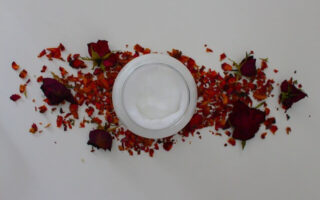Chemical exfoliation is a great way to remove the dead skin cells that can make your complexion look dull.
But, what are chemical exfoliants? How does chemical exfoliation work? And which one should you use for your skin type?
In this article, we’ll answer all of those questions and more. Plus, we’ll give you a few tips on how to get the most out of your chemical exfoliant treatment. So, read on!
What is chemical exfoliation?
Chemical exfoliation is the process of removing dead skin cells from the skin’s surface using an acidic or enzymatic solution through the use of a chemical exfoliant. This exfoliation differs from physical exfoliation, which uses abrasive particles to manually slough off dead skin cells.
How does chemical exfoliation work?
Applying a chemical exfoliant to your skin breaks down the bonds that hold dead skin cells together. This allows the dead skin cells to be sloughed away, revealing the healthy, glowing skin underneath. It also allows for better penetration of skincare products and can ultimately result in a more radiant complexion.
Chemical exfoliants come in different concentrations. The higher the concentration, the more powerful the exfoliation. But, with more power comes more risk. So, it’s important to start slow and work your way up to a higher concentration if you want to avoid any irritation.
How quickly does chemical exfoliation work?
Chemical exfoliation works gradually over time. You may not see a dramatic difference after your first treatment, but with repeated use, you will start to see a more radiant complexion. It’s important to note that chemical exfoliation can make your skin more sensitive to the sun. So, be sure to use sunscreen and limit your time in the sun after your treatment.
How do you know if a chemical exfoliant is working?
The effects of chemical exfoliation are not immediate, it takes time to work. If you’re not sure whether a chemical exfoliant is working, here are a few things to look for:
- A more radiant complexion
- Better absorption of skincare products
- Reduced appearance of pores
- Less acne and blackheads
- Reduced fine lines and wrinkles
Is chemical exfoliation better than physical?
There is no one-size-fits-all answer to this question, as the best type of exfoliation depends on your individual skin type. But, in general, chemical exfoliation is considered to be more effective than physical exfoliation. This is because chemical exfoliants work gradually over time to remove dead skin cells, while physical exfoliants can be harsh and cause irritation.
However, there are benefits to physical exfoliation. They can work well on areas of the body that tend to be rougher, such as the arms and back.
Check out our post on “Physical vs Chemical Exfoliation” to learn more!
Which chemical exfoliator is best for beginners?
If you’re just starting out with chemical exfoliation, it’s best to stick with a lower concentration exfoliant. This will allow your skin to get used to the treatment and help avoid any irritation. There are many gentle chemical exfoliants on the market, so you can find one that is right for your skin type.
What should I look for when buying an exfoliator?
When buying an exfoliator, it’s important to consider your individual skin type. Some things to look for include:
- Gentle ingredients: Look for an exfoliator that contains gentle ingredients, like fruit acids or enzymes, that will not irritate.
- A low concentration: If this is your first time trying chemical exfoliation, it’s best to go with a lower concentration product. This will help your skin acclimate to the treatment and avoid any potential irritation.
- A pH level of 3.5 or below: The lower the pH level of an exfoliant, the more acidic it is. This means it will be more effective in breaking down the bonds that hold dead skin cells together.
- Free from harsh beads: Avoid exfoliators that contain harsh beads or other abrasive particles. These can cause irritation, redness, and even micro-tears in the skin.
What ingredients to look for in a chemical exfoliant?
When looking for a chemical exfoliant, it’s important to consider the ingredients. Some ingredients to look for include:
- Alpha Hydroxy Acids
- Enzymes
- Retinol
- Glycolic Acid
- Malic Acid
- Lactic Acid
- Salicylic Acid




